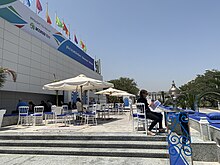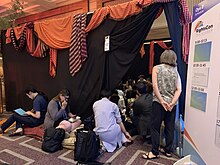| Formation | 2009 |
|---|---|
| Founders | Brett Solomon, Cameran Ashraf, Sina Rabbani and Kim Pham |
| Website | accessnow.org |


Access Now is a non-profit organization headquartered in Brooklyn, New York City, in the United States. It was founded in California in July 2009 and focuses on digital civil rights. The organization issues reports on global Internet censorship, and hosts the annual RightsCon human rights conference. It is a registered 501(c)(3) nonprofit organization. Its headquarters moved to New York at the beginning of 2022.
History
Access Now was established by Brett Solomon, Cameran Ashraf, Sina Rabbani and Kim Pham in 2009, after the contested Iranian presidential election of that year. During the protests that followed this election, Access Now disseminated the video footage which came out of Iran. Access Now has campaigned against internet shutdowns, online censorship, international trade agreements, and government surveillance. Access Now has supported the use of encryption and limited cyber security laws and regulations.
Operations
As of 2020, Access Now is a 501(c)(3) organization based in New York City in the United States, with staff, operations, and activities distributed in other places the world.
RightsCon
Access Now runs an annual conference, RightsCon, which focuses on issues concerning technology's impact on human rights. The conference was first held in Silicon Valley in 2011, followed by events in Rio de Janeiro, Brazil (2012), Silicon Valley (2014), Manila, Philippines (2015), and Silicon Valley (2016); thus alternated between Silicon Valley and a city in the Global South. After being held in Brussels and Toronto, RightsCon 2019 took place in Tunis, Tunisia (11–14 June). The 2019 RightsCon event gathered activists and stakeholders from all over the globe discussed the intersection between human rights and digitalization by government representatives, tech giants, policymakers, NGOs and independent activists. The discussions were about hate speech and freedom of expression, artificial intelligence, privacy and data security, open government and democracy, access, and many others.
In 2020, RightsCon was to be held in San José, Costa Rica, for the COVID-19 pandemic, so the meeting took place in the online format. In 2021, the 10th edition of RightsCon was again held online from Monday, June 7 to Friday, June 11, 2021 due to the continued global COVID-19 pandemic which altered several digital rights physical meetings. The topics for RightsCon2021 included: Artificial Intelligence (AI), automation, data protection and user control, digital futures, democracy, elections, new business models, content control, peacebuilding, censorship, internet shutdowns, freedom of the media and many others were discussed by several digital rights organizations and individuals.
In 2022, the 11th edition of RightsCon was planned to take place entirely online across all time zones from Monday, June 6 to Friday, June 10, 2022.
#KeepItOn project
Through its #KeepItOn project, Access Now makes an annual report and data set on internet shutdowns to track internet shutdowns, social media blockages, and internet slowdowns in countries around the world. This report and data are published every spring. Access Now fights against online repression, and provides grants and support to grassroots organizations to advance the rights of users and communities at risk of digital violations.
Methodology
Access Now gathers data by the Shutdown Tracker Optimization Project (STOP). This project uses remotely sensed data to initially identify shutdowns, blockages and throttling. Instances are confirmed using news reports, reports from local activists, official government statements, and statements from ISPs. Access Now defines Internet shutdowns as "an intentional disruption of the internet or electronic communications rendering them inaccessible or effectively unusable, for a specific population or within a location, often to exert control over the flow of information.". Individual instances are counted if the shutdown lasts longer than one hour.
Access Now's data capture fewer false positives but more false negatives compared to expert analysis of internet shutdowns, such as V-Dem Institute's Digital Society Project, or Freedom House's Freedom on the Net. Access Now's data are more likely to miss shutdowns than captured by other methods.
Impact
#KeepItOn data is used to measure shutdowns by a range of organizations and academic publications. The Millennium Challenge Corporation uses these data as a part of its Freedom of Information indicator on its annual scorecards, used for determining aid allocations. Access Now's reports are also used in calculating the total cost of internet shutdowns. Other articles use these data to track trends in internet censorship in various countries and regions.
Digital Security Helpline
The organization offers a 24/7 Helpline to advise victims of cyber-crime such as cyber-attacks, spyware campaigns, data theft, and other digital malfeasance, to protect citizens from digital attacks. Starting in 2009, it has offered support and direct technical advice to activists, journalists, and other human rights campaigners who are in need of digital security support, those facing cyber threats and attacks and those in need urgent support. The Digital Security Helpline was officially launched in 2013. Services include digital security guidance on topics such as how to protect against data and credential theft, and preventing targeted cyberattacks.
The Helpline has been credited with helping to build people-first digital infrastructures, and one content moderation request at a time. Supporters claim that the helpline provides lessons on how to build comprehensive and sustainable digital infrastructures while protecting the digital rights of the people they serve, including CSOs, activists, and human rights defenders.
Access Now's methods of using in-country volunteers to identify attacks from their own governments have been criticized as unethical due to the risk of government retribution for those reporting via the helpline and other methods.
References
- ^ "Access Now Combined Financial Statements for the Years Ended December 31, 2022 and 2021" (PDF).
Access Now is a nonprofit corporation incorporated in the State of California in July 2009.
- https://www.accessnow.org/wp-content/uploads/2024/02/990-2022-for-upload.pdf
- "Access Now | Digital Watch". dig.watch. Archived from the original on 2021-05-17. Retrieved 2021-05-17.
- https://act.accessnow.org/page/13742/donate/1
- Sterling, Bruce. "The latest EDRi-gram". Wired. ISSN 1059-1028. Retrieved 2024-08-02.
- ^ "#iranelection: The digital media response to the 2009 Iranian election". Archived from the original on 2016-08-28. Retrieved 2013-05-18.
- Farrell, Paul (27 May 2015). "Human rights groups condemn Nauru's criminalisation of political protest". the Guardian. Archived from the original on 2015-09-10. Retrieved 2015-09-21.
- "Blog | Access". www.accessnow.org. 28 August 2015. Archived from the original on 2015-10-02. Retrieved 2015-09-21.
- "Blog | Access". www.accessnow.org. 28 June 2015. Archived from the original on 2015-09-10. Retrieved 2015-09-21.
- Solomon, Brett (2016-05-11). "This Arcane Rule Change Would Give U.S. Law Enforcement New Power to Hack People Worldwide". Slate. ISSN 1091-2339. Archived from the original on 2016-11-05. Retrieved 2016-06-24.
- "Encrypt All The Things". encryptallthethings.net. Archived from the original on 2015-09-27. Retrieved 2015-09-21.
- "What Congress Can Do About Cybersecurity If CISA Fails". Archived from the original on 2015-10-20. Retrieved 2015-09-21.
- Access Now is a 501(c)(3) organization in the US, as documented in its 2019 Archived 2022-05-07 at the Wayback Machine IRS form 990.
- Burgess, Matt. "The Bizarre Reality of Getting Online in North Korea". Wired. ISSN 1059-1028. Retrieved 2024-08-02.
- "Access Now". Access Now. Archived from the original on 2011-07-18. Retrieved 2021-05-22.
- ^ "RightsCon Summit Series". rightscon.org. Archived from the original on 2015-09-12. Retrieved 2015-09-21.
- Welch, Chris (2018-03-23). "Sonos is pulling its ads off Facebook and Instagram, but only for a week". The Verge. Archived from the original on 2021-06-04. Retrieved 2021-06-04.
- Wekwete, Ory Okolloh, Sharon (12 June 2019). "As the continent digitizes rapidly, Africans need a bill of data rights to protect them online". Quartz. Archived from the original on 2021-06-04. Retrieved 2021-06-04.
{{cite web}}: CS1 maint: multiple names: authors list (link) - ^ "Human Rights Work in Africa: From Digitization in Uganda to #RightsCon 2019 in Tunisia - betterplace-lab". en. Archived from the original on 2021-06-04. Retrieved 2021-06-04.
- "Home - RightsCon Summit Series". RightsCon Summit Series. Archived from the original on 2019-06-16. Retrieved 2019-06-16.
- ^ "RightsCon 2021 | Digital Watch". dig.watch. Archived from the original on 2021-06-04. Retrieved 2021-06-04.
- "RIGHTSCON – WORLD'S LEADING SUMMIT ON HUMAN RIGHTS IN THE DIGITAL AGE". Global Forum for Media Development (GFMD). Archived from the original on 2021-06-04. Retrieved 2021-06-04.
- "RightsCon - Experience". RightsCon Summit Series. Archived from the original on 2017-01-25. Retrieved 2022-04-03.
- "Nica.team - Registration for the 11th edition of RightsCon is now open". University Ranking. Archived from the original on 2022-02-17. Retrieved 2022-04-03.
- Taye, Berhan (2021). "SHATTERED DREAMS AND LOST OPPORTUNITIES A year in the fight to #KeepItOn" (PDF). Access Now. Archived (PDF) from the original on 2021-06-02. Retrieved 2021-05-26.
- ^ Anthonio, Felicia; Cheng, Sage (2021). "Shutdown Tracker Optimization Project (STOP) Methodology" (PDF). Archived (PDF) from the original on 2023-01-17. Retrieved 2021-05-26.
- "Mapping internet shutdowns around the world". www.aljazeera.com. Archived from the original on 2021-06-04. Retrieved 2021-06-04.
- ^ Dazed (2021-10-22). "Access Now: how to defend human rights in the digital age". Dazed. Archived from the original on 2021-11-28. Retrieved 2022-04-03.
- ^ Fletcher, Terry; Hayes-Birchler, Andria (2020). "Comparing Measures of Internet Censorship: Analyzing the Tradeoffs between Expert Analysis and Remote Measurement". Presented at the Data for Policy Conference 2020. doi:10.5281/zenodo.3967398. S2CID 244992072 – via Zenodo.
- Fletcher, Terry; Hayes-Birchler, Andria (2020). "Comparing Measures of Internet Censorship: Analyzing the Tradeoffs between Expert Analysis and Remote Measurement". Presented at the Data for Policy Conference 2020. doi:10.5281/zenodo.3967398. S2CID 244992072 – via Zenodo.
- "Guide to the MCC Indicators for Fiscal Year 2021". Millennium Challenge Corporation. Archived from the original on 2021-05-26. Retrieved 2021-05-26.
- Kathuria, Rajat; Kedia, Mansi; Varma, Gangesh; Bagchi, Kaushambi; Sekhani, Richa (2018-04-30). "The Anatomy of an Internet Blackout: Measuring the Economic Impact of Internet Shutdowns in India". Think Asia. Archived from the original on 2021-05-26. Retrieved 2021-05-26.
- West, Darrell (2016). "Internet shutdowns cost countries $2.4 billion last year" (PDF). Brookings Center for Technology Innovation. Archived (PDF) from the original on 2021-05-26. Retrieved 2021-05-26.
- Wagner, Benjamin (2018). "Understanding Internet Shutdowns: A Case Study from Pakistan". International Journal of Communication. 12 (1): 3917–3938. ISSN 1932-8036. Archived from the original on 2021-05-26. Retrieved 2021-05-26.
- Freyburg, Tina; Garbe, Lisa (2018). "Blocking the Bottleneck: Internet Shutdowns and Ownership at Election Times in Sub-Saharan Africa". International Journal of Communication (in German). 12: 3896–3916. ISSN 1932-8036. Archived from the original on 2021-06-01. Retrieved 2021-05-26.
- C, Siddhant (2019-11-07). "Exploring Possible Solutions to Curb Internet Shutdowns in India". SSRN. Rochester, NY. doi:10.2139/ssrn.3644879. SSRN 3644879.
- ^ "The cybersecurity helpline protecting citizens from digital attacks". The Daily Swig | Cybersecurity news and views. 2019-04-18. Archived from the original on 2021-06-04. Retrieved 2021-06-04.
- ^ "Digital Security Helpline". Access Now. Archived from the original on 2021-06-07. Retrieved 2021-06-07.
- ^ "Facing the Challenge of an Evolving Digital Civil Space". Digital Impact. 2020-05-14. Archived from the original on 2021-06-04. Retrieved 2021-06-04.
- VanderSloot, B., McDonald, A., Scott, W., Halderman, J. A., & Ensafi, R. (2018). Quack: Scalable Remote Measurement of Application-Layer Censorship. In Proceedings of the 27th USENIX Security Symposium.
- Hoang, P. N., Doreen, S., Polychronakis, M., (2019). Measuring I2P Censorship at a Global Scale. In Proceedings of the 9th USENIX Workshop on Free and Open Communications on the Internet.
- Raman, R. S., Stoll, A., Dalek, J., Ramesh, R. Scott, W., & Ensafi, R. (2020). Measuring the Deployment of Network Censorship Filters at Global Scale. Network and Distributed System Security (NDSS) Symposium 2020.
- Weinberg, Zachary (2018). Toward Automated Worldwide Monitoring of Network-level Censorship (Thesis). Carnegie Mellon University – via ResearchGate.